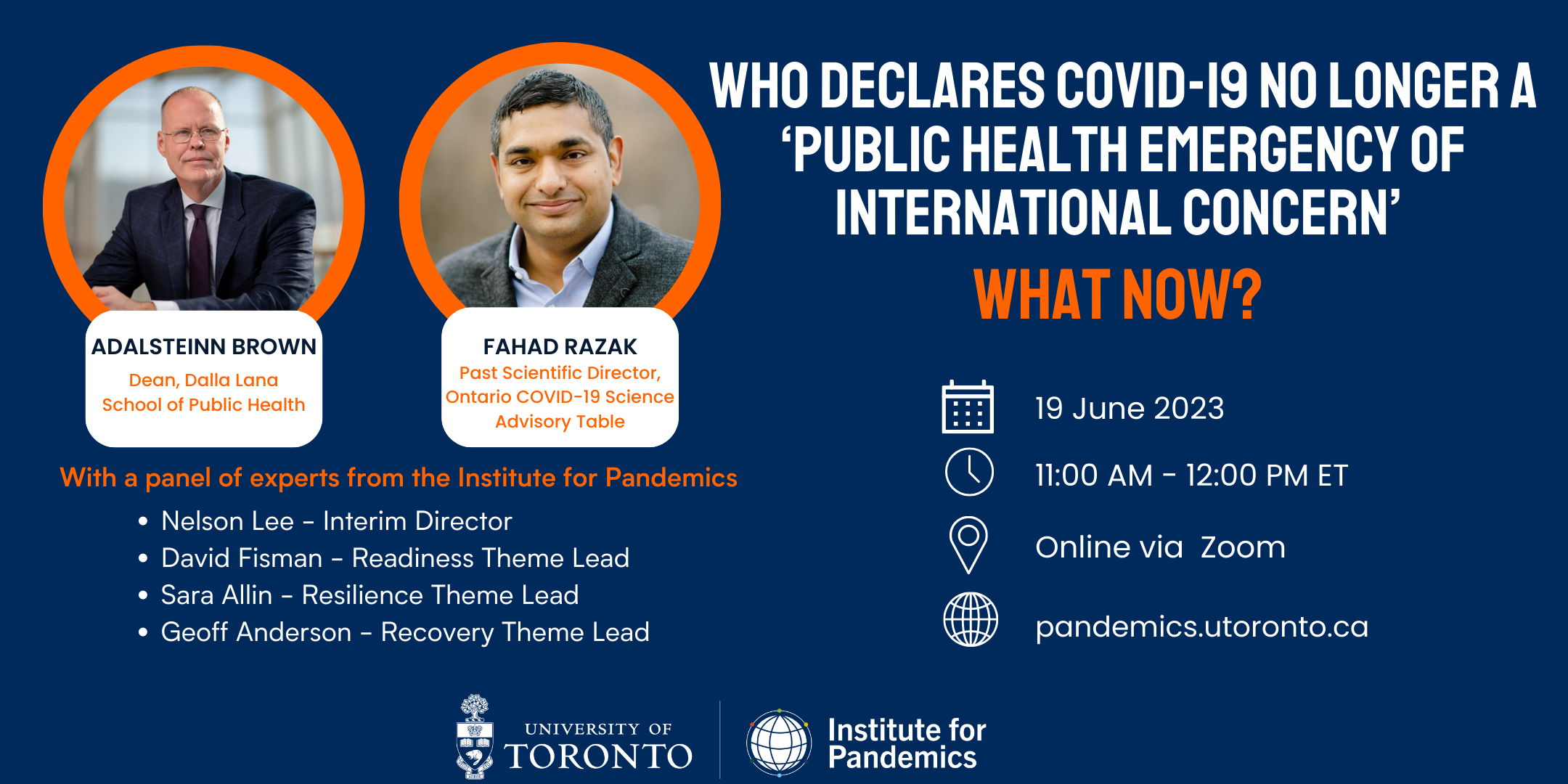
WHO declares COVID-19 no longer a ‘public health emergency of international concern’ – what now?
On May 5, 2023, the World Health Organization lifted the Public Health Emergency of International Concern for COVID-19 that began in January 2020, thus declaring “COVID-19 over as a global health emergency.” The end of the emergency phase of the pandemic is a major milestone.
Join the leaders of the Institute for Pandemics as they use this opportunity to take stock of our experience of the pandemic, what to expect as SARS-CoV-2 continues to evolve, and what we have learned for future pandemic preparedness.
This online webinar has a brief presentation by Fahad Razak, the past Scientific Director of the Ontario COVID-19 Science Advisory Table, followed by a panel discussion of leaders from the Institute for Pandemics, Nelson Lee (Director), David Fisman (Readiness Theme Lead), Sara Allin (Resilience Theme Lead), and Geoff Anderson (Recovery Theme Lead), moderated by Adalsteinn Brown, Dean of the Dalla Lana School of Public Health.
About the Presenters/Panelists
Fahad Razak, an internist and epidemiologist, and his research focuses on improving the care of hospitalized patients through application of advanced analytic methods to hospital big data. He co-founded GEMINI (https://www.geminimedicine.ca/), the largest hospital research network in Canada, and one of few such examples globally. GEMINI covers ~60% of Ontario’s medical hospital beds making it a living laboratory to study hospital care. He was the Scientific Director of the Ontario COVID-19 Science Advisory Table which informed Ontario’s response to the COVID pandemic. He co-authored >40 science and policy briefs that shaped the policy, public health and clinical response to the COVID-19 crisis.
Adalsteinn Brown is well known for his expertise in evidence-informed policy making, health-care quality improvement, and health systems capacity-building and strategy. He also has extensive entrepreneurial and leadership experience in the private and public sectors, including in the Ontario Ministry of Health and Long-term Care. Prior to serving as Dean of the Dalla Lana School of Public Health (DLSPH), he was Director of the Institute of Health Policy, Management and Evaluation, and while in this role, he led numerous complex initiatives, made possible by his collaborative partnerships with other universities, hospitals, government and international agencies. Prof. Brown played a critical role in Ontario’s pandemic response, along with many DLSPH faculty members. He worked collaboratively with the Ontario Premier and his cabinet on resilience and recovery measures and efforts. Prof. Brown is known in particular for his ability to clear complex hurdles to positive change in health care.
Nelson Lee is an infectious diseases physician who has been deeply involved in the research on emerging infectious diseases, epidemics and pandemics for almost two decades. With an interdisciplinary approach, he has conducted a wide range of studies to understand the epidemiology, disease burden, health outcomes, transmission modes and prevention, as well as antiviral and vaccine effectiveness against viral respiratory infections. His research is referenced by international health authorities, contributing to the prevention and control of epidemic viral diseases including coronavirus and influenza. Professor Lee is dedicated to his goals in preventing, effectively responding, and mitigating the impacts of pandemics through research and education. He joined the Dalla Lana School of Public Health in 2021 as the Interim Director of the Institute for Pandemics.
David Fisman is a physician and epidemiologist who studies the epidemiology of infectious diseases, particularly pneumonia. His interests include laboratory datasets as epidemiological resources, mathematical modeling and simulation, infectious disease and environment/climate change, and decision/cost effectiveness analysis. Professor Fisman’s work on COVID-19 has been focused on understanding sources of variability in severity and outcomes, and in mathematical modeling to identify control strategies and optimal uses of drugs and vaccines. He has created seminal models of COVID-19 spread in Ontario that have informed policy decisions.
Sara Allin is Assistant Professor at the Institute of Health Policy, Management and Evaluation at the University of Toronto, and Director of Operations of the North American Observatory on Health Systems and Policies. Prof. Allin conducts research that aims to improve health system performance, and comparative studies across provinces/territories and internationally in health care and public health. She founded the North American COVID-19 Monitor to systematically document the public health, health system and economic policies introduced in response to the COVID-19 pandemic in Canada, its provinces and territories, and the United States and Mexico.
Geoff Anderson is a Professor at the Institute of Health Policy, Management and Evaluation, University of Toronto. His research is focused on health outcomes in high-needs and vulnerable populations and has extensive experience in international comparisons of health policy and outcomes. He has acted as an advisor to federal and provincial governments on research and its impact. He has a PhD in Public Policy Analysis from the Rand Graduate Institute, United States, an MSc in Community Medicine from the University of Toronto, Canada, and an MD from the University of Ottawa, Canada.
